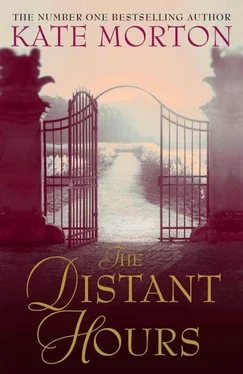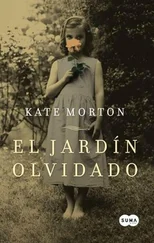‘Oh,’ I said, remembering. The morning seemed an awfully long time ago. ‘Terrific. Thanks.’
‘I’ve printed out everything I could find. I was going to ring you at work and let you know, but now you’re here!’
I thanked her again and gave the documents a cursory glance, flicking through pages detailing the institute’s history of conservation, making a small show of considering the information, before tucking them inside my bag. ‘I’m really looking forward to exploring them properly,’ I said, ‘but there’s something I need to do first.’ And I explained then that I was looking for information about a man. ‘Thomas Cavill is his name. He was a soldier during the Second World War and a teacher before that. He lived and worked near Elephant and Castle.’
She was nodding. ‘Is there anything in particular you were hoping to uncover?’
Why he failed to arrive at Milderhurst Castle for dinner in October 1941, why Juniper Blythe was plunged into a madness from which she never recovered, why my mother refused to talk to me about any aspect of her past. ‘Not really,’ I said. ‘Whatever I can find.’
Miss Yeats was a wizard. While I battled the microfilm machine solo, cursing the dial which refused to perform small incremental shifts and flew instead through weeks at a time, she darted about the library accumulating odd bits of paper from here and there. When we reconvened after half an hour, I brought a worse-for-wear newsreel and a crushing headache to the table, while she’d assembled a small but decent dossier of information.
There wasn’t much, certainly nowhere near the reams of local press concerning the Blythe family and their castle, but it was a start. There was a small birth notice from a 1916 Bermondsey Gazette , that read, CAVILL – Feb 22, at Henshaw St, the wife of Thomas Cavill of a son, Thomas , an effusive report in the Southwark Star from 1937, entitled ‘Local Teacher Wins Poetry Prize,’ and another from 1939 with a similarly unambiguous title, ‘Local Teacher Joins War Effort’. The second article contained a small photograph labelled ‘Mr Thomas Cavill’, but the copy was of such poor quality that I could tell little more about him than that he was a young man with a head, shoulders and a British army uniform. It seemed rather a small collection of public information to show for a man’s life and I was extremely disappointed to see that there was nothing at all from after 1939.
‘That’s it,’ I said, trying to sound philosophical rather than ungrateful.
‘Almost.’ Miss Yeats handed me another clutch of papers.
They were advertisements, all dated March 1981, all taken from the bottom corner of The Times , Guardian and Daily Telegraph classifieds. Each one bore the same message:
Would Thomas Cavill, once of Elephant and Castle, please telephone Theo on the following number as a matter of urgency: (01) 394 7521
‘Well,’ I said.
‘ Well ,’ Miss Yeats concurred. ‘Rather curious, wouldn’t you agree? Whatever could they mean?’
I shook my head. I had no idea. ‘One thing’s certain: this Theo, whoever he might be, was pretty keen to get in touch with Thomas.’
‘May I ask, dear – I mean, I certainly don’t like to pry, but is there anything here that helps you with your project?’
I took another look at the classifieds, pushed my hair behind my ears. ‘Perhaps.’
‘Because you know, if it’s his service record you’re interested in, the Imperial War Museum has a wonderful archive collection. Or else there’s the General Register Office for births, deaths and marriages. And I’m sure with just a little more time I could… oh dear,’ she said, flushing as she glanced at her watch, ‘but what a shame. It’s almost closing time. And right when we were getting somewhere. I don’t suppose there’s anything more I could do to help before they lock us in?’
‘Actually,’ I said, ‘there is one little thing. Do you think I could use your telephone?’
It had been eleven years since the advertisements were placed so I’m not sure what I expected, I know only what I hoped: that a fellow by the name of Theo would pick up at the other end and happily fill me in on the past fifty years of Thomas Cavill’s life. Needless to say, it’s not what happened. My first attempt was met by the rude insistence of a disconnection tone and I was so utterly frustrated that I couldn’t help but stamp my foot like a spoiled Victorian child. Miss Yeats was kind enough to ignore the tantrum, reminding me gently to convert the area code to 071 in line with the recent changes, then hovering very closely as I dialled the number. Under scrutiny I grew clumsy and had to try a second time, but finally – success!
I gave the receiver a quick tap to signal that the number had begun to ring; touched Miss Yeats’s shoulder excitedly when the line picked up. It was answered by a kindly lady who told me, when I asked for Theo, that she’d bought the house from an elderly man by that name the year before. ‘Theodore Cavill,’ she said, ‘that’s who you’re after, isn’t it?’
I could barely contain myself. Theodore Cavill . A relative, then. ‘That’s him.’
Beneath my nose, Miss Yeats clapped the heels of her hands like a seal.
‘He went to live in a nursing home in Putney,’ said the lady on the phone, ‘right by the river. He was very happy about that, I remember. Said he used to teach at a school across the way.’
I went to visit him. I went that very evening.
There were five nursing homes in Putney, only one of which was on the river, and I found it easily. The drizzle had blown away and the evening was warm and clear; I stood at the front like someone in a dream, comparing the address of the plain brick building before me to that in my notepad.
As soon as I set foot inside the foyer, I was accosted by the nurse on duty, a young woman with a pixie haircut and a way of smiling so that one side of her mouth rose higher than the other. I told her who I’d come to see and she grinned.
‘Oh, how lovely! He’s one of our sweetest is Theo.’
I felt my first pang of doubt then and returned her smile a little queasily. It had seemed like a good idea at the time, but now, beneath the stark fluorescent light of the hallway we were fast approaching, I wasn’t so sure. There was something not terribly likeable about a person prepared to impose upon an unsuspecting old gentleman, one of the nursing home’s sweetest. An arrant stranger with designs on the fellow’s family history. I considered backing out, but my guide was surprisingly invested in my visit and had already railroaded me through the foyer with breathtaking efficiency.
‘It’s lonely for them when they get near the end,’ she was saying, ‘especially if they never married. No kids or grand-kids to think about.’
I agreed and smiled and trailed her at a skip along the wide, white corridor. Door after door, the spaces between punctuated by wall-hung vases. Purple flowers, just this side of fresh, poked their heads over the top, and I wondered absently whose job it was to change them. I didn’t ask, though, and we didn’t stop, continuing right down the corridor until we reached a door at the very end. Through its glass panel, I could see that a neat garden lay on the other side. The nurse held open the door and tilted her head, indicating that I should go first, then followed closely on my heel.
‘Theo,’ she said, in a louder-than-normal voice, though to whom she spoke I couldn’t tell. ‘Someone here to see you. I’m sorry – ’ she turned to me – ‘I don’t remember your name.’
‘Edie. Edie Burchill.’
‘Edie Burchill’s here to visit, Theo.’
Читать дальше












